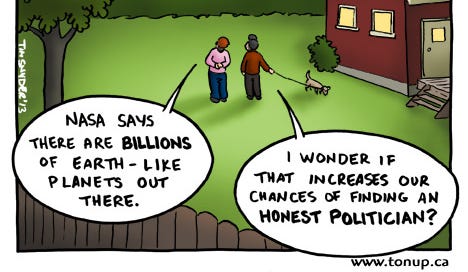Let's give citizens, not politicians, a seat at the table
“Whenever a man has cast a longing eye on offices, a rottenness begins in his conduct.” - Thomas Jefferson
Nobody trusts politicians. Okay, maybe 8% of people trust politicians—but that is the worst of any profession. We are wary of those who seek power. People who run for office may not, to steal a phrase from The Bachelor, be in it “for the right reasons.” If power, wealth, fame, or glory is their aim, then doing what’s best for the country isn’t a priority.
Frankly, that isn’t good enough. How broken is a system of government that puts in power the very type of people who shouldn’t have it? What is the point of elections if the people we get to choose between are all terrible options?
Many believe we need elections to select a delegate for the district: a voice of the constituents to enact their will. But elections actually make this impossible. Other forces—special interest groups, corporations, and political parties—crowd out the electorate’s will. The politician, in his self-interest, prioritizes the groups that can further his ambition.
More fundamentally, elections can’t reveal what the majority will is on any particular policy. You and I might vote for the same candidate, but for wildly different reasons. I might support his stance on taxes despite his stance on climate change, while you might support him because of his stance on climate change. A candidate’s electoral victory tells us nothing about whether a majority agreed with his stance on climate change. It simply shows that a plurality of people preferred that candidate—for whatever reason. It doesn’t tell us why.
Others view legislators as a trustee for the district: they can consider their constituent’s preferences but are free to vote how they see best. But this works only as far as we can trust legislators to do what’s best for the country. And for most politicians, we can’t.
We need to replace politicians with people we can trust. But therein lies the rub. Elections guarantee that the pool of candidates we select from is filled with people who seek power; people who would use the office to further their own aims and ambitions. Meanwhile, those who are best suited for office don’t run. “We would all like to vote for the best man, but he is never a candidate.” (Kin Hubbard)
So replacing legislators through elections isn’t enough. We wind up with the same type of power-seeking politicians as before. What we need is a way to place trustworthy people in office. And we can’t do that unless we change our method of selecting legislators.
Enter Democracy+. By randomly selecting legislators, we fill Congress with citizens, not politicians. We broaden the pool beyond self-serving, power-hungry people. In their place are you and me. Your neighbor. A relative.
These are people you can trust. You may not agree with them politically, but with a random sample you can be assured that each selected legislator acting in his or her self-interest will, in fact, represent the majority will.
That brings us full circle. Not only is Democracy+ a better fit than elections for the trustee model, a random sample ensures that legislators act as the voice of the people they represent—the delegate model. True, they may not speak on behalf of a particular geographic region (although in many instances, they will), but they do act as a delegate of the ideology they represent. Under Democracy+, we can trust that our voices will be heard because each of us can finally say: “someone like me has a seat at the table.”





Hmm. Randomly selecting electorates ... that sounds a lot like jury duty. What happens if someone doesn't show up? How would you determine someone is eligible to be selected? How much do you pay them? And how in the world will they find a place to live in DC (I've lived there and it's harder than you might think).
How long are there terms ?... I probably need to keep reading.